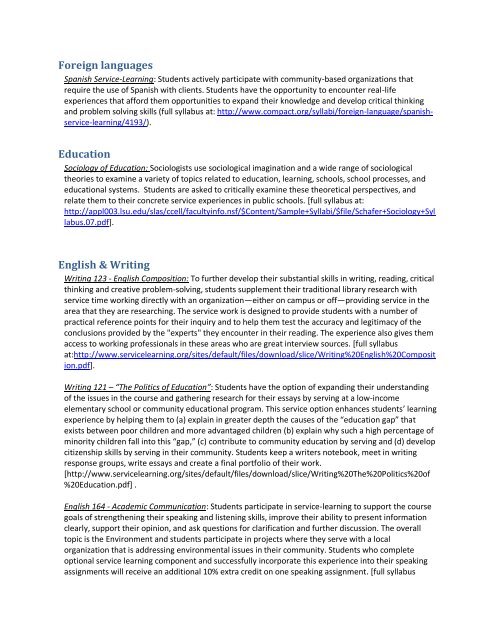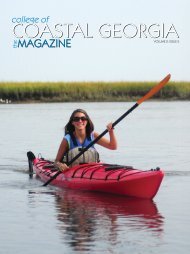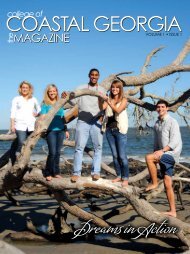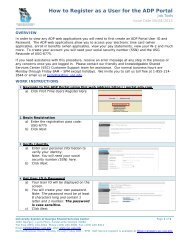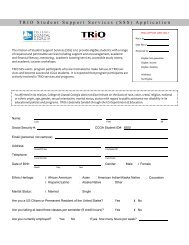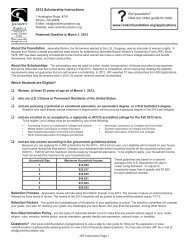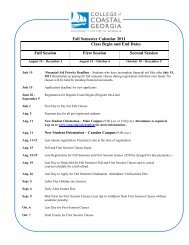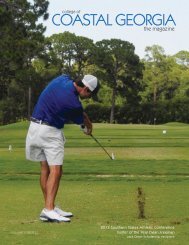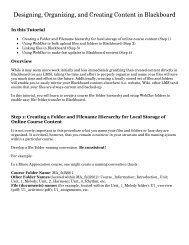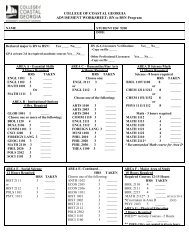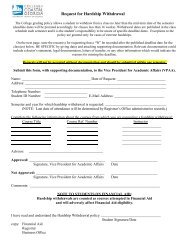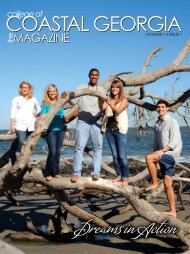Examples of Service-Learning Courses across the Disciplines
Examples of Service-Learning Courses across the Disciplines
Examples of Service-Learning Courses across the Disciplines
Create successful ePaper yourself
Turn your PDF publications into a flip-book with our unique Google optimized e-Paper software.
Foreign languagesSpanish <strong>Service</strong>-<strong>Learning</strong>: Students actively participate with community-based organizations thatrequire <strong>the</strong> use <strong>of</strong> Spanish with clients. Students have <strong>the</strong> opportunity to encounter real-lifeexperiences that afford <strong>the</strong>m opportunities to expand <strong>the</strong>ir knowledge and develop critical thinkingand problem solving skills (full syllabus at: http://www.compact.org/syllabi/foreign-language/spanishservice-learning/4193/).EducationSociology <strong>of</strong> Education: Sociologists use sociological imagination and a wide range <strong>of</strong> sociological<strong>the</strong>ories to examine a variety <strong>of</strong> topics related to education, learning, schools, school processes, andeducational systems. Students are asked to critically examine <strong>the</strong>se <strong>the</strong>oretical perspectives, andrelate <strong>the</strong>m to <strong>the</strong>ir concrete service experiences in public schools. [full syllabus at:http://appl003.lsu.edu/slas/ccell/facultyinfo.nsf/$Content/Sample+Syllabi/$file/Schafer+Sociology+Syllabus.07.pdf].English & WritingWriting 123 - English Composition: To fur<strong>the</strong>r develop <strong>the</strong>ir substantial skills in writing, reading, criticalthinking and creative problem-solving, students supplement <strong>the</strong>ir traditional library research withservice time working directly with an organization—ei<strong>the</strong>r on campus or <strong>of</strong>f—providing service in <strong>the</strong>area that <strong>the</strong>y are researching. The service work is designed to provide students with a number <strong>of</strong>practical reference points for <strong>the</strong>ir inquiry and to help <strong>the</strong>m test <strong>the</strong> accuracy and legitimacy <strong>of</strong> <strong>the</strong>conclusions provided by <strong>the</strong> "experts" <strong>the</strong>y encounter in <strong>the</strong>ir reading. The experience also gives <strong>the</strong>maccess to working pr<strong>of</strong>essionals in <strong>the</strong>se areas who are great interview sources. [full syllabusat:http://www.servicelearning.org/sites/default/files/download/slice/Writing%20English%20Composition.pdf].Writing 121 – “The Politics <strong>of</strong> Education”: Students have <strong>the</strong> option <strong>of</strong> expanding <strong>the</strong>ir understanding<strong>of</strong> <strong>the</strong> issues in <strong>the</strong> course and ga<strong>the</strong>ring research for <strong>the</strong>ir essays by serving at a low-incomeelementary school or community educational program. This service option enhances students’ learningexperience by helping <strong>the</strong>m to (a) explain in greater depth <strong>the</strong> causes <strong>of</strong> <strong>the</strong> “education gap” thatexists between poor children and more advantaged children (b) explain why such a high percentage <strong>of</strong>minority children fall into this “gap,” (c) contribute to community education by serving and (d) developcitizenship skills by serving in <strong>the</strong>ir community. Students keep a writers notebook, meet in writingresponse groups, write essays and create a final portfolio <strong>of</strong> <strong>the</strong>ir work.[http://www.servicelearning.org/sites/default/files/download/slice/Writing%20The%20Politics%20<strong>of</strong>%20Education.pdf] .English 164 - Academic Communication: Students participate in service-learning to support <strong>the</strong> coursegoals <strong>of</strong> streng<strong>the</strong>ning <strong>the</strong>ir speaking and listening skills, improve <strong>the</strong>ir ability to present informationclearly, support <strong>the</strong>ir opinion, and ask questions for clarification and fur<strong>the</strong>r discussion. The overalltopic is <strong>the</strong> Environment and students participate in projects where <strong>the</strong>y serve with a localorganization that is addressing environmental issues in <strong>the</strong>ir community. Students who completeoptional service learning component and successfully incorporate this experience into <strong>the</strong>ir speakingassignments will receive an additional 10% extra credit on one speaking assignment. [full syllabus


